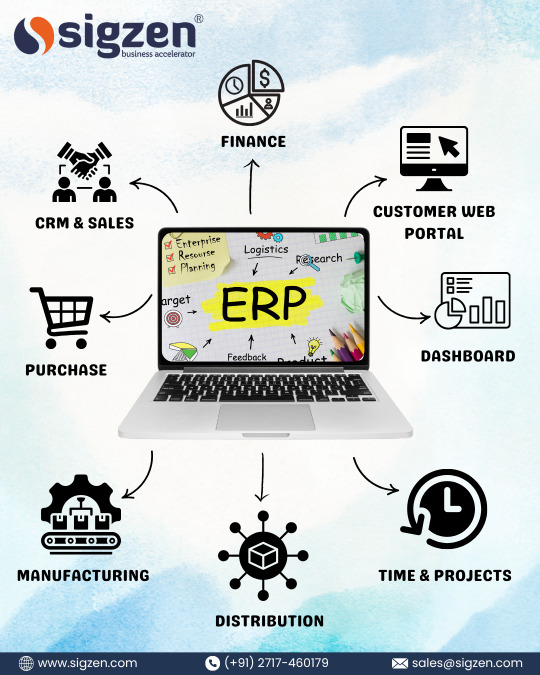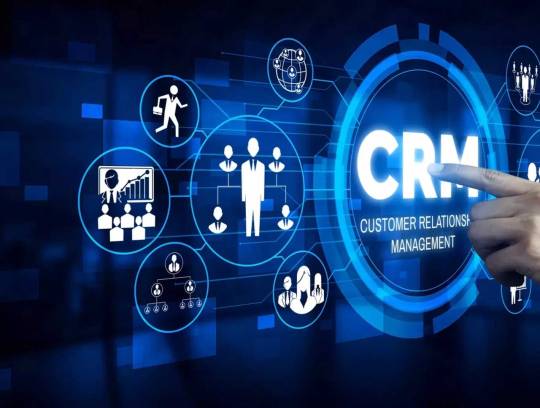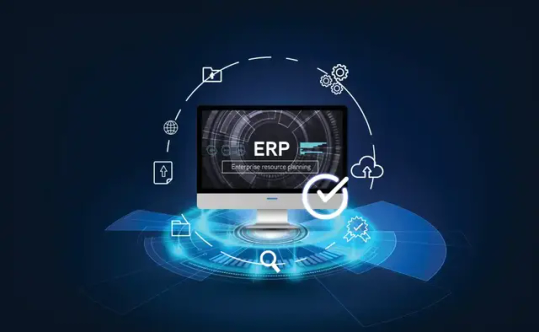#ERP and CRM
Explore tagged Tumblr posts
Text
The Hidden Costs of Not Having an ERP System

For many growing businesses, the decision to implement an ERP (Enterprise Resource Planning) system is postponed, not because it’s unnecessary, but because it feels avoidable. The upfront costs, learning curves, and change management can seem daunting. So, many leaders fall back on spreadsheets, siloed software, and manual workarounds.
But here’s the truth: not investing in an ERP doesn’t mean zero cost. It means hidden costs. Constant, compounding, corrosive costs.
In this comprehensive blog, we expose the true price businesses pay by not adopting a modern ERP system from operational inefficiencies and data fragmentation to missed revenue and declining customer satisfaction.
What Is ERP and Why It Matters
An ERP system is an integrated suite of applications that manages core business functions — finance, inventory, HR, procurement, customer relationship management (CRM), supply chain, and more from a single source of truth.
Instead of having departments operate in isolation using separate tools, ERP platforms connect the dots across your entire operation, ensuring data flows seamlessly, decisions are data-backed, and teams stay aligned.
The Illusion of Savings
Many businesses think they’re saving money by not buying ERP software.
But what they don’t realize is that the real costs are buried in everyday inefficiencies:
Time lost to duplication and rework
Mistakes from outdated or incorrect data
Expensive compliance errors
Delayed reporting and missed decisions
Labor costs that should have been automated
ERP isn’t an expense, it’s an investment in preventing waste, chaos, and stagnation.
Hidden Cost #1: Manual Processes
Without ERP, your workflows rely on:
Excel sheets for inventory
Paper-based invoicing
Email trails for approvals
Standalone POS and CRM systems
Each of these manual tasks adds friction, slows execution, and increases the risk of human error. Worse, they consume valuable employee time that could be spent on innovation or customer experience.
Hidden Cost #2: Data Silos and Inaccuracy
In a non-ERP environment, your sales data lives in one system, inventory in another, and finances in yet another. These data silos create:
Duplicate entries
Conflicting reports
Poor forecasting
Broken communication between teams
Imagine trying to make a financial forecast without knowing accurate stock levels or procurement timelines. That’s not strategy, it’s guesswork.
Hidden Cost #3: Poor Decision-Making
ERP gives leadership real-time visibility. Without it, you’re flying blind. Decisions are based on outdated reports, intuition, or partial data.
The consequences?
Overstocking or understocking
Hiring at the wrong time
Overspending on suppliers
Missed market trends
In fast-moving markets, poor decisions are silent killers.
Hidden Cost #4: Inefficiency and Wasted Time
Employees waste hours every week:
Reconciling data across systems
Chasing status updates
Creating reports manually
Resolving customer queries with incomplete info
ERP automates much of this. It turns chaotic workflows into streamlined processes. Time is money and ERP gives it back to you.
Hidden Cost #5: Compliance and Audit Risks
Whether it’s tax regulations, payroll compliance, or industry-specific audits, non–compliance can be catastrophic — financially and reputationally.
Without ERP:
Documentation is scattered
Approvals are untracked
Errors go unnoticed until it’s too late
ERP enforces workflow controls, maintains audit trails, and ensures you’re always inspection ready.
Hidden Cost #6: Inventory Chaos
Without real-time inventory visibility:
Stockouts frustrate customers
Overstocking ties up cash
Perishables expire unnoticed
Returns are mismanaged
ERP systems come with automated inventory management, reorder thresholds, and real-time alerts — saving money and customer relationships.
Hidden Cost #7: Customer Experience Failures
Your customer doesn’t care if your sales and service teams are on different systems — they just want fast answers and smooth service.
Without ERP:
Support teams lack order visibility
Sales don’t know service history
Personalization is impossible
Loyalty suffers
ERP integrates CRM, order history, and communications, so, everyone on your team is always in the know.
Hidden Cost #8: Lack of Agility and Scalability
Need to open a new location? Onboard more staff? Launch a new product line?
Without ERP:
Systems don’t scale
Processes break
Training becomes chaotic
Reporting takes weeks to adapt
Modern ERP platforms are modular, cloud-based, and future-ready designed to grow with you, not hold you back.
Hidden Cost #9: Lost Revenue Opportunities
Every time:
You miss a cross-sell
You delay an invoice
You ignore churn signals
You launch a campaign too late
…you’re losing revenue.
ERP systems with embedded analytics, smart recommendations, and marketing tools help you seize every opportunity, not miss it.
Hidden Cost #10: Talent Burnout and Attrition
Nothing demotivates top performers like:
Repetitive admin work
Poor tools and systems
Lack of clear KPIs
Bureaucratic delays
ERP enables role-based dashboards, automated workflows, and clear productivity insights helping teams feel empowered, not buried.
And in a talent-driven economy, employee experience = business performance.
What Modern ERP Brings to the Table
When you adopt a smart ERP like ERPONE, you unlock:
Real-time reporting
Automated compliance
Inventory intelligence
Customer journey tracking
Faster procurement cycles
Integrated HR and finance
Actionable analytics
Cloud scalability ERP isn’t just a tool. It’s a competitive advantage, turning operations into intelligence, and transactions into strategy.
Conclusion: The Cost of Doing Nothing
Doing nothing feels safe, until the hidden costs catch up.
You lose deals because of slow response times
You overspend without realizing
Your best people leave
Your data is unreliable
Your decisions lag behind market changes
ERP isn’t a luxury. It’s infrastructure for digital survival.
So, the question isn’t “Can we afford ERP?”
The real question is: How much longer can we afford not to?
0 notes
Text
Understanding AWS Services for ERP and CRM Integration

Introduction
In today’s fast-paced business environment, integrating Enterprise Resource Planning (ERP) and Customer Relationship Management (CRM) systems has become essential for organizations looking to streamline operations and improve customer experiences. Amazon Web Services (AWS) provides a robust suite of tools and services that facilitate seamless integration between ERP and CRM platforms, allowing businesses to achieve greater efficiency, scalability, and data-driven decision-making.
1. The Importance of ERP and CRM Integration
ERP systems manage core business processes such as finance, supply chain, and human resources, while CRM systems focus on customer interactions and sales management. Integrating these systems leads to:
Enhanced Data Accuracy: Eliminating data silos reduces errors and inconsistencies
Comprehensive Customer Insights: Combining operational and customer data provides a holistic view of business performance.
Improved Decision-Making: Access to unified data enables more informed strategic decisions.
According to Priority Software, such integration promotes improved organizational collaboration and personalized customer experiences.
2. AWS Services Facilitating ERP and CRM Integration
AWS offers a variety of services that support the integration of ERP and CRM systems:
AWS Marketplace
AWS Marketplace provides a range of ERP and CRM solutions that can be deployed quickly and scaled as needed. Businesses can select from top vendors, benefiting from flexible pricing and customizable features tailored to their industry needs.
Amazon AppFlow
Amazon AppFlow enables secure data transfer between AWS services and SaaS applications like Salesforce. This service simplifies the integration of CRM data with other AWS services, facilitating real-time data analysis and reporting.
AWS Lambda and API Gateway
For custom integration needs, AWS Lambda allows businesses to run code in response to events without needing to provision servers, while API Gateway enables the creation of robust APIs. Together, they support the development of tailored integration solutions between ERP and CRM systems.
Amazon RDS and Amazon S3
Amazon Relational Database Service (RDS) and Amazon Simple Storage Service (S3) provide scalable and secure data storage solutions that are essential for managing the large volumes of data generated by ERP and CRM systems.
3. Benefits of Integrating ERP and CRM on AWS
Implementing ERP and CRM integration using AWS services offers several advantages:
Scalability: AWS’s infrastructure supports business growth without requiring significant upfront investments.
Cost-Effectiveness: Pay-as-you-go pricing models help reduce capital expenditures and align costs with actual usage.
Improved Security: AWS offers robust security measures that ensure data protection and compliance with industry standards.
Operational Efficiency: Automated workflows and real-time data access streamline business processes.
As highlighted by AWS, integrating ERP systems results in operational efficiency, data integration, cost savings, and scalability.
4. Real-World Application: SAP ERP Integration with AWS
Many mid-sized companies and enterprises have successfully integrated SAP ERP systems with AWS, automating business processes such as order processing, inventory management, and CRM. This integration enhances productivity, agility, and profitability by providing a secure platform for managing and accessing data.
Conclusion
Integrating ERP and CRM systems using AWS services enables businesses to unify their operations, gain comprehensive insights, and respond swiftly to market changes. AWS’s scalable infrastructure, diverse service offerings, and commitment to security make it an ideal platform for organizations looking to enhance operational efficiency and customer engagement through integrated solutions.
0 notes
Text
Why Choosing the Best ERP and CRM Development Company Matters
In today’s fast-paced business environment, companies are constantly seeking ways to improve efficiency, enhance customer relationships, and drive growth. One of the most effective ways to achieve these goals is by implementing robust Enterprise Resource Planning (ERP) and Customer Relationship Management (CRM) systems. However, the success of these systems largely depends on the expertise and reliability of the development company you choose. This article explores why selecting the best ERP and CRM development company is crucial for maximizing visibility and ensuring your business thrives in a competitive landscape.

The Importance of ERP and CRM Development
Understanding the importance of ERP development and CRM development is crucial for modern businesses. ERP development integrates finance, HR, manufacturing, and supply chain management, streamlining operations into one cohesive platform. In contrast, CRM development enhances customer interactions, improves service delivery, and boosts customer satisfaction. Together, these developments foster efficiency, drive growth, and enable informed decision-making, ultimately contributing to business success.
According to a report by Statista, the global CRM software market is expected to reach approximately $113 billion by 2027. This significant growth underscores the increasing reliance on CRM solutions to foster customer relationships and streamline business processes. Similarly, ERP systems are predicted to grow at a CAGR of 10.2% from 2021 to 2028, indicating that businesses recognize the value of integrated solutions for operational efficiency.
Why Choose the Best ERP and CRM Development Company?
Expertise and Experience
Choosing a reputable development company means accessing a wealth of expertise and experience. The best ERP and CRM development companies have a proven track record of successfully implementing systems across various industries. Their knowledge allows them to identify unique challenges and tailor solutions to meet your specific business needs.
Customization and Scalability
Every business is unique, and a one-size-fits-all approach often leads to inefficiencies. The best companies understand this and offer customized solutions that can scale as your business grows. Whether you need specific features, integrations, or modules, a top-tier development company will work closely with you to create a system that aligns perfectly with your objectives.
Enhanced Data Visibility
One of the primary benefits of ERP and CRM systems is improved data visibility. By choosing the right development partner, you ensure that your systems provide real-time insights into operations and customer interactions. According to a study by Nucleus Research, businesses that utilize integrated ERP systems can see productivity gains of 20% or more. This enhanced visibility not only supports informed decision-making but also empowers employees to work more efficiently.
Ongoing Support and Maintenance
The journey doesn’t end after implementation. The best ERP and CRM development companies provide ongoing support and maintenance to ensure your systems function optimally. Regular updates, troubleshooting, and user training are critical for maximizing the value of your investment. With a reliable partner, you can rest assured that any issues will be promptly addressed, minimizing disruptions to your operations.
Cost-Effectiveness
While some may be tempted to opt for cheaper alternatives, investing in the best ERP and CRM development company can lead to significant long-term savings. According to Gartner, organizations that effectively utilize ERP solutions can reduce operational costs by 15% to 20%. By streamlining processes and improving efficiency, the right system ultimately pays for itself.
How to Choose the Right Development Company
When searching for the best ERP and CRM development company, consider the following factors:
Industry Expertise: Look for a company with experience in your specific industry. They will better understand your challenges and requirements.
Client Reviews and Case Studies: Research past clients and case studies to gauge their success. Testimonials can provide valuable insights into the company’s reliability and performance.
Technological Proficiency: Ensure the company is proficient in the latest technologies and trends in ERP and CRM development. This knowledge is essential for creating scalable and future-proof solutions.
Customization Capabilities: Ask about their ability to customize solutions. The best companies will be willing to adapt their offerings to meet your specific needs.
Support Services: Inquire about their post-implementation support services. A good development partner should provide ongoing assistance to ensure your system continues to meet your evolving business needs.
Maximizing visibility and operational efficiency in your business hinges on selecting the best ERP and CRM development company. With the right partner, you can expect tailored solutions, ongoing support, and enhanced data visibility that drives informed decision-making and fosters growth. As you embark on this journey, consider Bytelogic Technologies, a leader in ERP and CRM development solutions. With a commitment to excellence and a track record of success, Bytelogic Technologies can help you transform your business and achieve your goals.
0 notes
Text
Best ERP & CRM development company in Noida- Kickr Technology
In an era where business operations demand efficiency and streamlined processes, the significance of robust ERP and CRM solutions cannot be overstated. Companies in Noida and beyond are increasingly turning to specialised IT firms for bespoke ERP and CRM software that meets their unique needs. Among these firms, Kickr Technology has emerged as the best ERP & CRM development company in Noida, providing cutting-edge solutions that empower businesses to excel in their respective domains.

The Importance of ERP and CRM Systems
Enterprise Resource Planning (ERP) and Customer Relationship Management (CRM) systems are integral to modern business operations. ERP systems help in managing and automating core business processes, ensuring data accuracy, and improving productivity. On the other hand, CRM systems are designed to enhance customer interactions, boost sales, and foster long-term relationships.
Why Choose Kickr Technology?
Kickr Technology has established itself as a premier provider of CRM software development services and ERP solutions. Their commitment to quality, innovation, and customer satisfaction sets them apart from other IT firms in Noida. Here are some reasons why Kickr Technology is the best ERP & CRM development company in Noida:
Expertise and Experience: With years of experience in the IT sector, Kickr Technology boasts a team of skilled professionals adept at delivering CRM and ERP development services. Their deep understanding of various industries allows them to create customised solutions that align with clients’ specific needs.
Expertise and Experience: With years of experience in the IT sector, Kickr Technology boasts a team of skilled professionals adept at delivering CRM and ERP development services. Their deep understanding of various industries allows them to create customised solutions that align with clients’ specific needs.
Innovative Solutions: At Kickr Technology, innovation is at the heart of their services. They leverage the latest technologies and industry best practices to develop ERP and CRM systems that are not only efficient but also scalable and future-proof.
Client-Centric Approach: Understanding that each business is unique, Kickr Technology adopts a client-centric approach. They work closely with clients to understand their requirements and deliver tailored solutions that drive business growth.
Comprehensive Services: From consultation and design to development and support, Kickr Technology offers end-to-end CRM and ERP development services. Their comprehensive service suite ensures that clients receive holistic solutions that address all aspects of their business operations.
Latest Updates from Kickr Technology
In keeping with their commitment to staying ahead of the curve, Kickr Technology recently announced the launch of their new AI-powered CRM module. This latest update integrates advanced artificial intelligence features to help businesses gain deeper insights into customer behaviour, predict trends, and automate routine tasks. This innovative module is set to revolutionise how businesses interact with their customers, making Kickr Technology’s CRM software development services even more valuable.
Success Stories
Kickr Technology’s portfolio is replete with success stories that highlight their expertise in delivering Best CRM and ERP development services. One such example is a leading retail chain in Noida that approached Kickr Technology to revamp their outdated ERP system. The team at Kickr Technology developed a comprehensive ERP solution that streamlined their inventory management, improved supply chain visibility, and enhanced overall operational efficiency.
Another notable success story involves a growing e-commerce company that needed a robust CRM system to manage their expanding customer base. Kickr Technology delivered a customised CRM solution that enabled the company to track customer interactions, manage leads more effectively, and boost sales conversions. The result was a significant improvement in customer satisfaction and business growth.
Kickr Technology's Commitment to Quality
Quality is a cornerstone of Kickr Technology’s service delivery. They adhere to stringent quality assurance processes to ensure that every solution they deliver meets the highest standards of performance, security, and reliability. Their dedication to quality has earned them a reputation as the best ERP & CRM development company in Noida.
Future Prospects
As businesses continue to navigate the challenges of the digital age, the demand for advanced ERP and CRM solutions is expected to grow. Kickr Technology is well-positioned to meet this demand with their innovative approach and commitment to excellence. They are continually investing in research and development to enhance their service offerings and provide clients with the tools they need to succeed in a competitive market.
Conclusion
In conclusion, if you are looking for the best ERP & CRM development company in Noida, look no further than Kickr Technology. Their expertise in CRM software development services, coupled with their client-centric approach and innovative solutions, make them the ideal partner for businesses seeking to optimise their operations and improve customer relationships. With Kickr Technology, you can be assured of receiving top-tier CRM and ERP development services that drive tangible results for your business.
Contact us today for getting Best CRM and ERP Development Services in Noida, visit us at https://kickrtechnologies.com/
0 notes
Text
Java Developer-Full stack with React.js
Job title: Java Developer-Full stack with React.js Company: Adecco Job description: Java Developer – Full Stack (Java 21 / React.js) Location: London (Hybrid – 3 days onsite) Contract: 6-Month Contract…-office operations You’ll play a key role in building full–stack solutions using Java 21 and React.js, collaborating closely… Expected salary: Location: London Job date: Thu, 17 Jul 2025 00:39:43…
#5G#Aerospace#audio-dsp#business-intelligence#cloud-computing#cloud-native#CRM#Crypto#Cybersecurity#deep-learning#digital-twin#embedded-systems#erp#fintech#full-stack developer#gcp#hybrid-work#Java#project-management#regtech#remote-jobs#robotics#rpa#SoC#system-administration#technical-writing#telecoms#uk-jobs#visa-sponsorship
2 notes
·
View notes
Text
3 notes
·
View notes
Text

All-in-one ERP Solution for smarter business operations! From Finance to Manufacturing, manage everything in one place with Sigzen.
💼 Streamline. Automate. Grow. 🔗 www.sigzen.com
#erpnext#business software#erp implementation#business optimization#erp software solutions#manufacturing solutions#crm integration#crm services#sales
2 notes
·
View notes
Text
Top 5 data management mistakes costing UAE businesses millions
Introduction
In an increasingly digital economy, poor data practices have become more than just an IT issue—they are an enterprise-level risk.

Across the UAE, businesses are losing millions annually due to fragmented systems, inconsistent governance, and reactive strategies.
In this article, we’ll unpack five critical data managementmistakes, their tangible costs, and what forward-thinking firms are doing to stay compliant, competitive, and data-resilient in 2025.
1. Fragmented Data Silos Across Departments
While decentralization may speed up local decision-making, it often comes at the cost of data cohesion. Sales, marketing, finance, and operations frequently maintain isolated datasets that never sync—each with its own metrics, definitions, and reporting cycles. The cost? Missed opportunities, duplicated efforts, inconsistent KPIs, and customer insights that are either delayed or distorted due to incompatible sources. Fix: Implement centralized data lakes or unified ERP/CRM systems to bridge these silos. Introduce cross-departmental governance protocols, and enforce scheduled data synchronization to maintain consistency across all business functions.
2. Weak Data Governance and Access Controls
Many UAE businesses still lack formal governance policies. There’s little clarity on who owns the data, who can access it, and how data quality is maintained across systems and touchpoints. The cost? Increased risk of data breaches, GDPR/DIFC non-compliance, unauthorized exposure of sensitive information, and eroded stakeholder trust—especially in sectors like healthcare, finance, and public services. Fix: Deploy a robust data governance framework with clearly defined roles, role-based access controls, automated audit trails, and regular compliance reviews. Embed accountability at every stage of data creation and usage.
3. Overreliance on Legacy Infrastructure
Outdated database architectures, manual Excel trackers, and siloed on-prem systems continue to dominate back-end processes—despite widespread digital front-ends. The cost? Performance bottlenecks during scale, limited real-time data visibility, high IT maintenance overheads, and an inability to integrate with modern analytics or automation tools. Fix: Migrate to cloud-native platforms that support elastic scaling, system redundancy, and embedded analytics. Incorporate APIs for seamless integration with existing digital tools while phasing out legacy dependencies.
4. Lack of Data Quality Assurance
Inconsistent formats, missing fields, outdated records, and duplicated entries remain common issues across enterprise datasets—especially when multiple input sources aren’t standardized.
The cost?
Flawed business reports, poor AI/ML model performance, customer experience setbacks, and incorrect decision-making based on unreliable data.
Fix:
Introduce end-to-end data quality frameworks that include automated validation checks, enrichment protocols, and AI-driven anomaly detection.
Regular audits and cleansing routines should be part of standard operations.
5. Treating Data Strategy as a One-Off Project
Many businesses initiate data initiatives as one-time efforts—an implementation followed by months (or years) of stagnation.
Without ongoing refinement, systems become outdated, and processes lose alignment with evolving business needs.
The cost?
Strategic misalignment, increasing technical debt, and declining ROI on digital investments that fail to evolve with the organization’s goals.
Fix:
Create a living data strategy—an adaptive roadmap reviewed quarterly, driven by key stakeholders across departments.
Tie progress to measurable KPIs like operational efficiency, customer satisfaction, or revenue growth from data-led initiatives.
Turn Costly Data Chaos into Smart Business Decisions: Nordstar Vision
At Nordstar Vision, we help businesses move from fragmented systems to future-ready data ecosystems.
Whether you’re struggling with outdated infrastructure, data silos, or lack of governance, our team brings tailored solutions to help you scale confidently in a data-first economy.
Let’s turn your data into a growth engine.
Reach out to us today at +(971) 50 1108756 or visit nordstartvision.
#data management UAE#business data mistakes#UAE data strategy#data governance UAE#database management Dubai#digital transformation UAE#legacy system issues#cloud migration UAE#data silos#enterprise data solutions#data compliance UAE#Nordstar Vision#data quality assurance#CRM data issues#ERP data integration#UAE business IT risks#data-driven decisions#business analytics UAE#smart data practices
2 notes
·
View notes
Text
ERP software company in Bhopal | shantitechnology
Shantitechnology (STERP) is a trusted name among ERP solution providers in India, offering customised and scalable ERP systems tailored to meet the unique needs of manufacturing businesses. As a leading ERP software company in Bhopal, we specialise in delivering comprehensive manufacturing enterprise resource planning software that optimises operations, enhances productivity, and ensures seamless resource management. We are recognised as one of the top ERP software companies in Madhya Pradesh, providing robust and industry-specific solutions. Whether you are looking for ERP for manufacturing company in Bhopal or reliable ERP software providers in Bhopal, STERP is your go-to partner for streamlined digital transformation.
Contact us today to schedule a demo and see how our ERP solutions can revolutionise your manufacturing process!
#ERP solution providers in India#ERP for manufacturing company in Bhopal#ERP software companies in Madhya Pradesh#ERP software company in Bhopal#Manufacturing enterprise resource planning software#ERP software providers in Bhopal#Indore#Bhopal#Madhya Pradesh#India#ERP Solution#ERP software#Custom ERP Software#CRM#Business#ERP
5 notes
·
View notes
Text


Best ERP and CRM Software Company in India | JRS Dynamics Info Solutions
Looking for reliable ERP and CRM solutions? JRS Dynamics Info Solutions is your go-to partner for streamlining business operations and driving growth.
Why Choose JRS Dynamics? ✅ End-to-End ERP Solutions ✅ Advanced CRM Systems ✅ Industry-Specific Customizations ✅ Implementation, Support & Upgrades
JRS Dynamics, we deliver cutting-edge technology to help businesses in India thrive in a competitive landscape.
Explore our services at: https://jrsdynamics.com/
Empower your business with the best ERP and CRM solutions from JRS Dynamics!
#crm#crm software#crm solutions#crm management software#erp#erpsoftware#dynamics365#erp solutions provider#digitaltransformation#businessmanagement#businessgrowth#businesssolutions#microsoftdynamics365#erp system#softwaredevelopment
4 notes
·
View notes
Text

Services for Mobile Application Development 📱
Use specialized mobile solutions to revolutionize your company by:
✅ Automate Processes ✅ Integrate Current Systems ✅ Increase Productivity and Sales
Among our offerings are: 🔹 Process Automation 🔹 Custom App Development 🔹 Existing Software Integration 🔹 Sales Tracking Systems 🔹 ERP & CRM Support
Please get in touch with us at [email protected] or +91 9891107522.
Allow us to assist you in creating mobile solutions that are more intelligent, quick, and scalable! 🚀
#MobileAppDevelopment#ProcessAutomation#CustomSolutions#ERP#CRM#Innovation#BusinessGrowth#WTPL#webapphealing#appdevelopment#Noida#customapp#ondemandapp
2 notes
·
View notes
Text
The Future of ERP: Trends You Can’t Ignore in 2025 and Beyond

Enterprise Resource Planning (ERP) systems have long been the backbone of business operations from manufacturing and logistics to finance and HR. But the ERP of today is unrecognizable from its earlier, rigid incarnations. What was once clunky and transactional is now becoming sleek, cloud-powered, AI-fuelled, and responsive in real time.
As we step into 2025 and beyond, ERP is no longer just about planning resources — it’s about anticipating needs, optimizing continuously, and enabling strategic growth at digital speed.
In this blog, we dive into the key ERP trends that are shaping the future of intelligent business and why you can’t afford to ignore them.
In this blog, we dive into the key ERP trends that are shaping the future of intelligent business and why you can’t afford to ignore them.
Why the Future of ERP Demands Attention Now
We’re in an era of unprecedented disruption. From global supply chain volatility to workforce decentralization and customer expectations shaped by Amazon-like immediacy, ERP is being forced to evolve or become irrelevant.
Businesses can no longer afford data silos, batch reporting, or on-prem legacy systems. What they need is a real-time, integrated, and predictive ERP platform that evolves with them.
Cloud-Native ERP: The Shift from Infrastructure to Intelligence
The future of ERP is undoubtedly cloud-first. Organizations are increasingly migrating to cloud-native ERP platforms for agility, scalability, and cost-efficiency.
Benefits:
Instant global access
Auto-scaling infrastructure
Seamless updates and patches
Real-time backups and disaster recovery
Easier integration with other SaaS tools
Cloud ERP is also the enabler of all other future trends from AI to IoT to remote collaboration.
Composable ERP: Flexibility Over Monoliths
Gone are the days when businesses were shackled to bloated, all-in-one ERP suites. In 2025, the future is composable.
What is Composable ERP?
It’s a modular, plug-and-play approach where companies can select microservices or applications tailored to their unique needs, whether it’s procurement, talent management, or compliance.
Advantages:
Faster deployment
Business-specific functionality
Easier upgrades
Vendor agnosticism
Composable ERP = agility + customization, at enterprise scale.
AI and Machine Learning: The New Brain of ERP
Artificial Intelligence is no longer a buzzword; it’s an ERP essential.
AI Use Cases in ERP:
Predictive analytics for demand planning and inventory
Automated invoice matching in accounts payable
AI chatbots for internal employee queries
Smart workflows that adapt in real-time based on input data
ML algorithms learn from business patterns, improving decisions with every transaction.
ERP is becoming less reactive, more cognitive.
Hyper automation and Intelligent Workflows
Hyper automation driven by AI, RPA (Robotic Process Automation), and low-code platforms is revolutionizing how ERP functions.
Examples:
Auto-generating POs when stock hits a threshold
Syncing HR onboarding workflows across departments
Triggering alerts based on real-time exceptions
Hyper automation frees up humans from the mundane to focus on strategic initiatives — a huge productivity leap.
Real-Time Analytics: Decisions Without Delay
Real-time analytics has become the lifeline for agile decision-making.
Modern ERPs are embedding live dashboards, KPI tracking, and predictive insights directly into workflows eliminating the need to switch between BI tools.
You no longer analyze what happened — you analyze what’s happening.
Benefits:
Proactive inventory control
Real-time cash flow visibility
Early detection of bottlenecks
Vertical-Specific ERP Solutions
Generic ERP systems are giving way to industry-specific platforms that understand the nuances of niche sectors.
Examples:
ERP for Manufacturing: Supports JIT production, MRP, MES integration
ERP for Healthcare: Ensures HIPAA compliance, EHR integration
ERP for Retail: Real-time POS sync, omnichannel support
ERP for Construction: Project-based accounting, job costing, contractor portals
Specialization enables faster ROI and better operational alignment.
ERP and Sustainability: The Greener the Better
As ESG (Environmental, Social, and Governance) becomes a board-level priority, ERP systems are evolving to support sustainability reporting and compliance.
Key Capabilities:
Track carbon footprint across supply chains
Monitor energy and water usage
Ensure ethical sourcing
Report on DEI and compliance initiatives
Future ERP will be as much about purpose as performance.
Integration with IoT and Edge Computing
ERP is moving closer to the edge literally.
In manufacturing and logistics, ERP is increasingly connected to IoT sensors, RFID, and smart devices to deliver live insights from the field.
Use Cases:
Machine uptime monitoring
Predictive maintenance alerts
Live GPS tracking in logistics
Cold chain compliance in pharma
Edge-connected ERP ensures decisions are made where the action is.
Cybersecurity and ERP: Zero Trust Becomes Norm
With data breaches at an all-time high, security is no longer optional, especially in ERP platforms that hold sensitive financial, operational, and customer data.
Future-ready ERPs are implementing:
Zero Trust Architecture
Role-based access controls
Multi-factor authentication
End-to-end encryption
AI threat detection
Secure ERP is the foundation for continuity and compliance.
The Rise of Mobile-First and Remote-Ready ERP
The hybrid workforce is here to stay. Your ERP needs to work from anywhere.
Modern platforms now offer:
Native mobile apps
Voice-command functionality
Offline data sync
GPS-enabled field service management
Whether it’s a CFO checking approvals on a flight, or a field agent updating job status from a remote village, mobility is critical.
Conclusion: Reinvent, or Risk Irrelevance
The future of ERP is not just a technological upgrade; it’s a strategic reinvention. From the boardroom to the factory floor, ERP systems are becoming intelligent, composable, and indispensable.
If your current ERP can’t:
Deliver real-time insights
Automate intelligently
Support remote work
Integrate with new-age tools
Scale without breaking
…it’s time for an upgrade.
Don’t think of ERP as software. Think of it as your business’s digital operating system. The smarter it is, the stronger your future will be.
0 notes
Text
Transforming HR with Odoo 18: Smarter Hiring, Management & Growth
Discover how Odoo 18 revolutionizes HR with seamless hiring, payroll, and performance tracking. Partner with RAVA Global Solutions, the best Odoo partner in USA, for expert implementation and support to streamline your HR operations.
2 notes
·
View notes
Text

Unlock your business potential with custom Odoo development. From streamlined processes to enhanced user experience, we build solutions that fit your unique needs.
#odoo#erp#odooerp#software#accounting#business#erpsoftware#odoodevelopment#odoopartner#crm#odooapps#erpsolutions#iwesabe#odoointegration#pos#odooimplementation#erpsystem#management#erpsolution#clouderp#bisnis#accountant#manager#odoocustomization#finance#leukeun#outsourcing#technology#ecommerce#website
2 notes
·
View notes